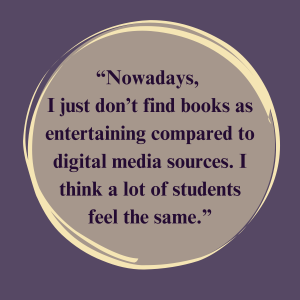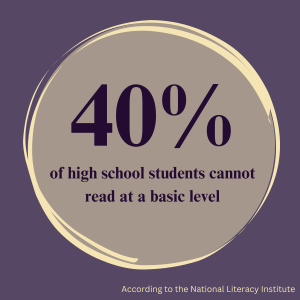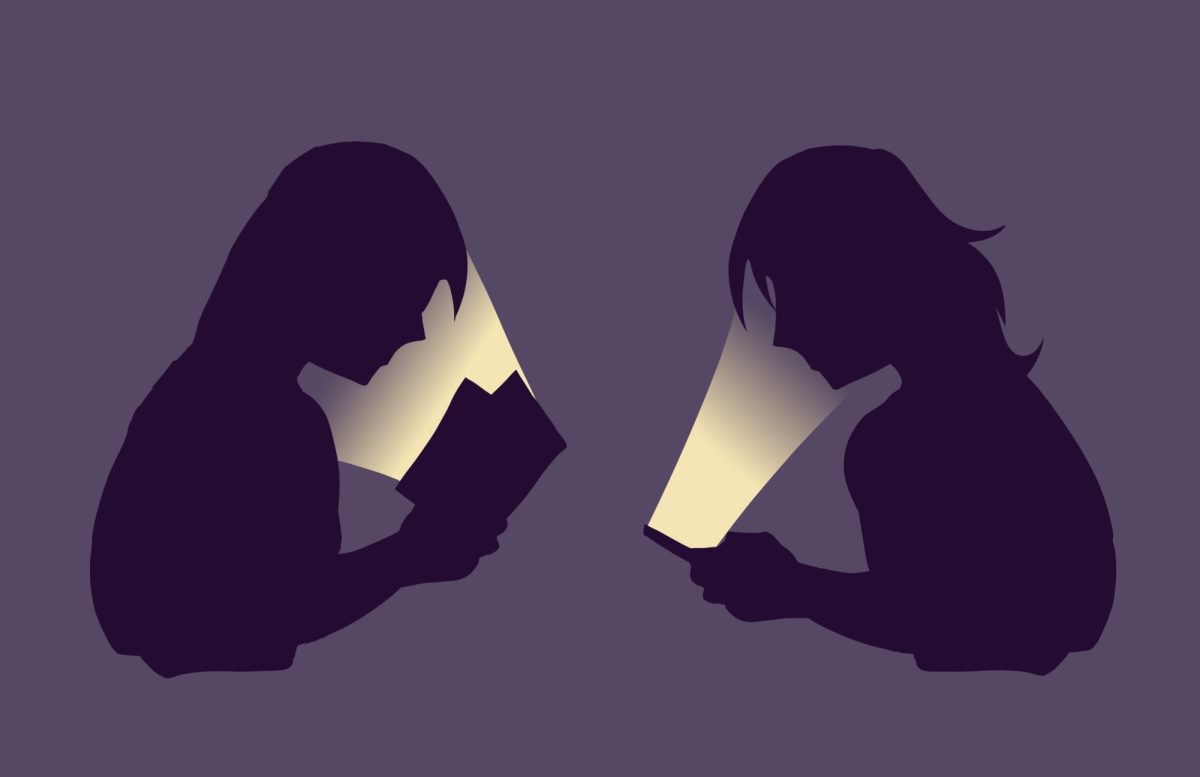CK: Hi, I’m Corinna.
AS: And I’m Amberly.
CK: Today we’ll be trying to answer the question: Why aren’t students reading anymore?
AS: Well, back when I was in elementary school and had a lot of free time I would walk to the library every week to check out 5-7 books I would read throughout the week. Nowadays, I just don’t find books as entertaining compared to digital media sources. I think a lot of students feel the same.
CK: Also, although high school students might not be as interested in reading anymore, they might also not have enough time. Only a couple years ago, I read an average of one to two books every week, and although I still try to read as much as possible, now, I barely have time to read. As we get older, we have less free time because of additional responsibilities like homework. According to Challenge Success, 38% of students report 3.5 hours or more of homework every night. We should also consider that the average MVHS student might also be spending more time on homework and extracurricular activities than the average teenager.  Many MVHS students are taking AP and honors classes, which heavily increases the amount of homework. I know last year I spent upwards of five hours a week on homework for a single class, not to mention the constant studying for tests or the homework for all of my other classes. And I’m pretty sure I’m not the only one.
Many MVHS students are taking AP and honors classes, which heavily increases the amount of homework. I know last year I spent upwards of five hours a week on homework for a single class, not to mention the constant studying for tests or the homework for all of my other classes. And I’m pretty sure I’m not the only one.
AS: When students do have leisure time, they’re far more likely to spend it on social media. I know I would much rather use my cell phone over reading a slow-paced book. According to the Pew Research Center, teens spend 3 hours and 4 minutes on average of their leisure time on screens.
CK: Digital media also corrodes students’ attention span, which decreases their abilities to slow down and read a book. In a study done by the University of California, Irvine, it was found that in the past few years, people’s attention spans have actually diminished to 47 seconds from 75 seconds in 2012.
AS: Books simply cannot compare to fast-paced media. I know personally that over time, my ability to read has decreased. Whenever I have to read my history textbook, I struggle to focus on the long-winded passages.
CK: In lit class, we often read excerpts and short stories which, according to an article from The Week, conditions students to not be able to read long materials, instead focusing on simulating standardized reading-comprehension tests. There has also been a shift to reading graphic novels, which can seem less energy intensive to read. I know my mom was surprised when we read “American Born Chinese” by Gene Luen Yang in HAmLit, because we read it as a family when I was in sixth grade.
AS: I think expectations for students’ reading abilities and skills are dwindling, leading to students not being engaged and not developing reading skills. For example, in fifth grade I read and analyzed the book “The Giver,” and I did the same thing in eighth grade. The funny thing is, the level of analysis was around the same.
CK: Now, in high school — in one of my classes, at least — analysis wasn’t required. We read the books, but sometimes it felt like there was no purpose to it. But why are these expectations lowering?
AS: I think it’s because students aren’t reading due to previous reasons, so their reading skills are getting worse, so teachers must respond by assigning easier assignments. According to the National Literacy Institute, approximately 40% of students across the nation cannot read at a basic level. A lot of teachers can’t assign longer and more complex reading assignments because of the lack of students’ skills.
 CK: This creates a cycle where students begin to find reading boring and reading skills worsen. This could also cause students who enjoy reading to also become disengaged with lessons. I feel like it’s overall very detrimental to everyone involved.
CK: This creates a cycle where students begin to find reading boring and reading skills worsen. This could also cause students who enjoy reading to also become disengaged with lessons. I feel like it’s overall very detrimental to everyone involved.
AS: Also, due to technology like ChatGPT, students can bypass reading by summarizing or getting assignments answered for them. Tools like SparkNotes and other online services have always existed, but ChatGPT is much more straightforward to use. Obviously, this benefits students in the short term by allowing them to save time, but in the long run, it’s degrading their analytical skills.
AS: Unlike me, you actually enjoy reading. So what are some tips that can make students love reading like you, especially when most students our age don’t?
CK: Well, one of the reasons I believe I haven’t lost my love of reading is because I don’t have social media, so I am not as affected by the growing trend of short attention spans. Also, I know students who think of reading as a punishment or task just because they associate it with schoolwork. But there are so many books out there, and you don’t need to constantly analyze or search for deeper meanings while reading for fun. When I read books now, I can take some of the skills from English classes to create a deeper appreciation for stories, but I don’t feel required to spend all of my mental focus on deeply analyzing it. I can just focus on immersing myself in the story instead.
AS: Wow, I hope someday I can regain my love for reading. I think I seek the same escapism and entertainment I once found within books in other, more easily digestible, avenues like social media. Especially since I, just like you said, associate books with school, maybe if I change my view that books are solely for educational purposes, I can regain some of that past passion.
AS: Well that’s all for today! Thanks for listening!
CK: This is Corinna and Amberly, signing off!
Music credit: “I don’t need your love” by Adi Goldstein on Uppbeat | Used with permission























